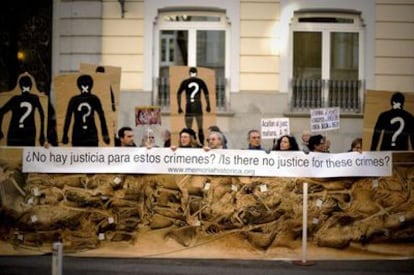Court prosecutor sides with Garzón in Franco-inquiry trial
Magistrate's career under threat on charges of overstepping authority for investigating Civil War and dictatorship crimes
Speaking during the opening day of Judge Baltasar Garzón's trial, on charges that he overstepped his authority by illegally opening an investigation into crimes committed during the 1936-39 Civil War and ensuing Franco dictatorship, the Supreme Court's chief prosecutor publicly called for the case to be dropped.
Luis Navajas sided with Garzón's defense team, which called for a dismissal of the case because the briefs filed by complainants were "not valid for prosecution." The Supreme Court recessed until next Tuesday to consider the arguments.
Garzón's lawyer, Gonzalo Martínez-Fresneda, said that the justice who investigated the case, Luciano Varela, did not act impartially when he allowed one of the complainants, the obscure rightwing union Manos Limpias, "to make changes" in its brief so he could initiate the inquiry in 2010.
The union drafted a new complaint based on Varela's own wording.
Martínez-Fresneda also asked the top court to apply the so-called "Botín doctrine," which rules that a criminal trial cannot be held based solely on a people's complaint, and especially when the prosecution is asking for a dismissal.
None of the groups that filed the complaints have jurisdiction because they would not have been directly affected by Garzón's decisions, Martínez-Fresneda said.
Chief prosecutor Navajas called Varela's investigation and subsequent ruling charging Garzón "strange" and "unsustainable," and asked the justices to move fast in dropping the case "before the European Court of Human Rights tells our Supreme Court that we violated the rules of procedure."
"Never in my 35 years as a lawyer have I seen a resolution such as Varela's," Navajas said. "It was an absolutely strange decision in which the result was to transmute a charge that isn't even sustainable [by the evidence]; one that couldn't be corrected but the justice helped correct."
The seven-member bench has put Garzón on trial for disregarding the 1977 amnesty law when four years ago he opened a court investigation into human rights abuses committed during the Civil War and the subsequent Franco dictatorship. Varela's probable cause ruling led to Garzón's suspension from the High Court bench.
It is the second time in two weeks that the 56-year-old magistrate has been put on trial before the Supreme Court. A four-day trial - over charges that he illegally violated the constitutional rights of jailed defendants in a public corruption case by authorizing the taping of their conversations with their lawyers - concluded on Friday. The Supreme Court is yet to hand down a verdict.
Manos Limpias, the group Libertad e Identidad, and the Falange de las JONS party originally filed the complaints against the judge, alleging that he purposely ignored a 1977 amnesty law, passed two years after the death of former dictator Francisco Franco.
Manos Limpias is asking that he be barred from the bench for 20 years. The Falange party was later removed from the case on a technicality.
The union's lawyer, Joaquín Ruiz Infante, rejected all the arguments presented by Garzón's lawyer in dropping the case. While he said he sympathized with the victims of the Franco regime, Ruiz Infante said the trial was based on whether or not Garzón abused his power. The victims and the survivors who petitioned the High Court to open the inquiry "have nothing to do with the current case in hand," he said.
Garzón allies rush to his defense
Meanwhile, about 300 Garzón supporters gathered outside the Supreme Court to cheer him on. Representatives of at least nine international human rights organizations have converged on Madrid to show support for the judge.
"This [trial] shows the total impunity of the crimes of Francoism," Marco González of the Association for the Recovery of Historical Memory told Reuters outside the court. "It's not just Garzón who is being judged today, but the right of people to search for vanished loved ones, for there to be a little justice, truth and reparation."
"Given Judge Baltasar Garzón's success at investigating and prosecuting crimes under international law around the world, it beggars belief that Spanish judicial authorities would seek to prevent him from investigating such crimes in Spain," said Hugo Relva, legal advisor at Amnesty International, who is in Madrid to observe the trial.
"The charges against him must be dropped, as they represent a blow to human rights and efforts to obtain justice."
The Geneva-based International Commission of Jurists is also calling for Garzón's acquittal, saying the 1977 amnesty must be set aside to respect international law.








































